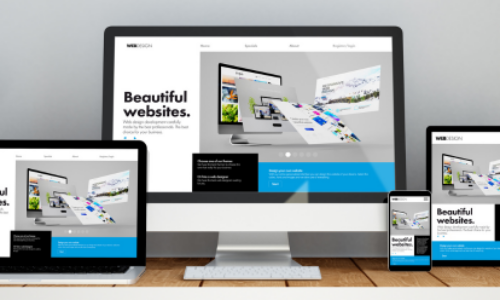
Table of Contents
ToggleSmall Business Website in 2023: Top 10 Reasons You Need One Now
Introduction to the importance of a website for small business owners
In the age of digitalization, having a website has become more crucial than ever before. With the ever-increasing reliance on the internet, businesses of all sizes need a digital web presence, to remain competitive and relevant. A well-designed and functional website can help businesses grow, attract customers, and improve their overall brand image.
Websites provide numerous benefits for businesses of all sizes. From increasing brand visibility to reaching new customers, a website serves as a powerful platform to showcase a business’s offerings and values. Moreover, it allows businesses to engage with customers, gather valuable feedback, and provide efficient customer service.
I. Customers expect every business to have a website
In addition to providing you with credibility as an enterprise you can also show potential customers that you actually are in business. No, we aren’t saying everybody is conspiracy-theorists. Obviously, most customers expect businesses to provide more accurate data to help them understand their needs.
A. Meeting customer expectations
Nowadays, customers expect businesses to have an online presence. They often search for products or services online before making a purchase decision, and a well-structured website can make a strong impression on potential customers. By providing detailed information about your products, services, and company, a website helps customers make informed decisions and builds trust in your brand (Forbes).
B. Enhancing customer satisfaction
A website allows businesses to enhance customer satisfaction by providing easy access to important information and resources. Customers can quickly find answers to their questions, submit inquiries, or complete transactions without having to visit a physical store or office. This convenience saves time and effort for both the customer and the business, ultimately improving the overall customer experience.

II. A Website is Cost-Effective Marketing
A. Your business is always available to customers
A well-designed website serves as a 24/7 marketing tool, allowing potential customers to learn about your business and offerings at any time. This continuous availability expands your reach and helps you target a wider audience. Additionally, by implementing search engine optimization (SEO) strategies, you can increase your website’s visibility in search results, further driving organic traffic and generating leads.
B. Return on investment (ROI)
Investing in a website can yield a high return on investment (ROI) when compared to traditional marketing methods. A well-optimized website can attract new customers, build brand awareness, and generate sales leads without the ongoing costs of print or broadcast advertising. Additionally, a website’s analytics data can provide valuable insights into customer behavior, enabling businesses to make informed decisions about their marketing strategies and overall growth.
III. Your Small Business Website Increases Credibility
A. Establishing professionalism
Having a well-designed and informative website helps establish professionalism and credibility for your business. A website that showcases your products, services, and company values effectively communicates your brand’s expertise and dedication to customer satisfaction. According to a study conducted by Stanford University, 75% of users judge a company’s credibility based on its website design (Stanford Web Credibility Research).
B. Building trust with potential customers
A website allows businesses to provide essential information, testimonials, and case studies that can help build trust with potential customers. By demonstrating your industry knowledge, showcasing past successes, and offering helpful resources, you can create a strong foundation of trust that encourages customers to choose your business over competitors.
C. Your website shows your social proof
Social proof is a powerful psychological phenomenon where people follow the actions of others, assuming that those actions represent the correct behavior. In the context of your business, social proof can significantly influence the decision-making process of potential clients and customers.
Your website is an ideal platform to showcase your social proof, which can include customer testimonials, reviews from review sites, case studies, and endorsements from industry experts. By highlighting the positive experiences and opinions of your existing customers, you can demonstrate the value of your products or services and build trust with prospective clients.
Additionally, integrating social media feeds or links on your website can further enhance your social proof. By showcasing your business’s engagement on social media platforms, you can display your strong online presence and foster credibility among potential customers. This integration also allows visitors to see the interactions between your brand and its followers, reinforcing the idea that your products or services are well-received by your customers.

IV. Generates Leads and Sales Through Your Website
A. The importance of online presence for sales
A robust online presence is crucial for generating leads and sales in today’s digital landscape. According to a report from the US Department of Commerce, e-commerce sales have been steadily growing and accounted for 16.1% of total retail sales in 2020 (US Census Bureau). Having a user-friendly and engaging ecommerce store or website allows you to tap into this expanding market and drive revenue growth for your business.
B. Lead generation strategies for websites
Your website can serve as a powerful lead generation tool by incorporating various strategies designed to attract and engage potential customers. Here are some effective lead generation strategies for websites:
- Valuable content: Create informative and engaging content, such as blog posts, articles, videos, or whitepapers, that addresses the needs and interests of your target audience. High-quality content not only attracts visitors but also establishes your expertise, encouraging potential customers to trust your business.
- Clear calls-to-action (CTAs): Place clear and compelling CTAs throughout your website, prompting visitors to take specific actions, such as signing up for newsletters, downloading resources, or requesting more information. Well-designed CTAs can significantly improve conversion rates and generate more leads.
- Lead capture forms: Implement strategically placed lead capture forms to collect contact information from interested visitors. Make sure to keep these forms simple and ask for only essential information to encourage more submissions.
- Email marketing: Use email marketing campaigns to nurture leads and maintain communication with potential customers. By sharing relevant content and promotional offers, you can keep your business top-of-mind and encourage leads to convert into paying customers.
- Social media integration: Connect your website with your social media profiles to increase visibility and engagement. Share your content on social platforms and encourage visitors to share it with their networks, expanding your reach and generating more leads.
- Search engine optimization (SEO): Optimize your website for search engines by incorporating relevant keywords, creating a user-friendly design, and ensuring fast loading times. Effective SEO helps improve your website’s ranking in search results, attracting more organic traffic and potential leads.
- Landing pages: Create dedicated landing pages for specific marketing campaigns, tailored to the needs and interests of your target audience. These pages should focus on a single offer or call-to-action, making it easy for visitors to convert into leads.

V. Websites Provide Control
A. Content management
A website gives you full control over the content and presentation of your business’s online presence. With content management systems (CMS) such as WordPress, businesses can easily update, manage, and publish content on their website without the need for specialized technical expertise. This flexibility allows you to ensure that your website remains current, relevant, and engaging for visitors.
B. Tailoring your website to your brand
A well-designed website can be customized to reflect your business’s unique brand identity. By choosing colors, fonts, and design elements that align with your brand’s values and personality, you can create a cohesive and memorable online presence. This tailored approach to web design helps differentiate your business from competitors and fosters brand recognition and loyalty among your target audience.
VI. Data and Analytics From Your Website
A. Tracking user behavior
Websites offer a wealth of data and analytics, allowing businesses to track user behavior and gain valuable insights into their customers’ preferences and needs. Tools like Google Analytics enable you to monitor website traffic, user demographics local search used, and user behavior, providing a comprehensive understanding of how visitors interact with your website and its content.
B. Making data-driven decisions
By leveraging the data and analytics provided by your website, you can make informed decisions about your marketing strategies, product offerings, and overall business direction. This data-driven approach allows you to optimize your website, improve user experience, and target your marketing efforts more effectively, ultimately leading to increased conversions and business growth. A study from the Massachusetts Institute of Technology (MIT) found that companies that are data-driven have a higher probability of success compared to their competitors (MIT Sloan School of Management).
VII. Business Sites Showcases Products and Services
A. Displaying product and service offerings
A website serves as an excellent platform for showcasing your products and services to potential customers. By providing detailed descriptions, images, and pricing information, you can help customers make informed decisions about their purchases. Additionally, a website allows you to highlight special offers, promotions, and new product launches, ensuring that your audience is always up-to-date on your latest offerings.
B. Using visuals and multimedia to enhance engagement
Incorporating visuals and multimedia elements into your website can significantly enhance user engagement and improve overall user experience. High-quality images, videos, and interactive elements can showcase your products and services more effectively, allowing users to better understand their features and benefits. Moreover, engaging multimedia content can help you stand out from the competition and create a lasting impression on potential customers.
VIII. Builds Relationships with Customers
A. Using your website to communicate with customers
A website enables businesses to maintain open lines of communication with customers, fostering strong relationships and promoting customer loyalty. Here are some ways your website or business page can facilitate communication with customers:
- Contact forms: Embedding contact forms on your website allows visitors to reach out with questions, concerns, or feedback. By responding promptly to these inquiries, you demonstrate that you value their input and are committed to providing excellent customer service.
- Email newsletters: Email newsletters provide an opportunity to share relevant information, updates, and promotions with your customers. By consistently delivering valuable content to their inboxes, you can stay top-of-mind and nurture your relationship with subscribers.
- Live chat: Implementing live chat on your website enables customers to receive real-time assistance, enhancing their overall experience. This instant support can lead to increased satisfaction, improved trust, and a stronger connection with your brand.
- Blog comments: Encourage interaction on your blog by inviting visitors to leave comments or ask questions. Engaging with your audience in this way can foster a sense of community, making customers feel more connected to your business.
- Social media integration: Linking your website to your social media profiles helps bridge the gap between your online presence and your customers. This integration allows customers to easily follow your brand on their preferred platforms, opening up more opportunities for communication and interaction.
- Personalization: Utilize website personalization to offer tailored content and recommendations based on user behavior, preferences, and browsing history. Personalized experiences can make customers feel valued and understood, further strengthening their relationship with your brand.
By leveraging your website as a communication hub, you can build and maintain strong relationships with your customers, ultimately leading to increased customer satisfaction, loyalty, and long-term success for local customers and your business.

B. Collecting customer feedback
Websites offer local businesses the opportunity to collect customer feedback through reviews, surveys, and other interactive tools. This feedback not only helps improve your products and services but also fosters customer loyalty by demonstrating that you value their opinions. According to a study from Harvard Business School, companies that respond to customer feedback tend to have higher customer satisfaction and retention rates (Harvard Business School). By actively engaging with your customers and addressing their concerns, you can strengthen your relationships and boost your business’s reputation.

IX. Provides a Competitive Advantage
A. Standing out from the competition
A well-designed and optimized website can provide a significant competitive advantage for your business. By showcasing your unique offerings and values, you can differentiate your brand from competitors and attract more customers. Additionally, a user-friendly and engaging website can leave a lasting impression on visitors, encouraging them to choose your business over others.
B. Utilizing website features to improve customer experience
Incorporating advanced features and functionalities into your website can greatly enhance customer experience and provide a competitive edge. Features such as live chat, personalized product recommendations, and responsive design can improve user satisfaction, boost conversions, and promote customer loyalty. By investing in these features, you can stay ahead of the competition and ensure that your business remains relevant in the ever-evolving digital landscape.
C. Websites allow you to compete with bigger brands
Small businesses can often offer more personal service over larger brands such as personalized product offerings. However there is often no simple way to display the value they can offer, especially for smaller businesses. In this area, the use of a small business website is helpful. Small business websites are useful for gaining local business search opportunities.
X. Long-Term Investment
A. The lasting value of a website
A website is a long-term investment that can deliver significant returns over time. As your business evolves, your website can be updated and expanded to accommodate new products, services, and marketing initiatives. This adaptability ensures that your website remains a valuable asset for your business, helping you attract and retain customers for years to come.
B. Adapting your website for the future
To maximize the lasting value of your website, it’s important to keep up with emerging technologies and trends. This includes optimizing your website for mobile devices, implementing search engine optimization (SEO) best practices, and incorporating new features that enhance user experience. By staying ahead of the curve and continually updating your website, you can ensure that your business remains competitive and relevant in the ever-changing digital world.
Recap of the top 10 reasons every business needs a website
Investing in a website is essential for businesses of all sizes in today’s digital age. Here is a recap of the top 10 reasons why your business needs a website:
- Meeting customer expectations
- Providing cost-effective marketing
- Increasing credibility and professionalism
- Building trust with potential customers
- Generating leads and sales
- Offering control over content and branding
- Accessing valuable data and analytics for informed decision-making
- Showcasing products and services effectively
- Building relationships with customers through communication and feedback
- Gaining a competitive advantage in the market
Conclusion
As the digital marketing landscape continues to evolve, having a website is more crucial than ever. A well-designed and optimized website can help your business grow, attract customers, and improve your overall brand image. By investing in a website, you are not only meeting the expectations of modern customers but also positioning your business for long-term success in the increasingly competitive online marketplace. Don’t miss out on the numerous benefits a website can offer – take the step to establish your online presence and secure your business’s future.
FAQs
Q. Do I Need a Website if I Have a Facebook Page?
Businesses typically use Facebook to promote advertisements and use other social networks. They also provide advantages. They help to build a bigger audience and help to conduct business analysis. Don’t get it misconstrued however, Facebook pages can’t replace your company website.
Q. What makes having a website essential for my business in 2023?
In 2023, many business owners say having a website is essential due to the increasing reliance on digital channels for information and commerce. A website helps you reach a wider audience, showcase your products or services, and compete effectively in the online marketplace.
Q. How does a website help in meeting customer expectations in 2023?
Customers in 2023 expect businesses to have an online presence where they can easily access information about products and services, make purchases, and get support. A website meets these expectations by providing a platform for customers to interact with your business conveniently and efficiently.
Q. Can a website improve my business’s credibility?
Yes, a website can significantly improve your business’s credibility. A professional and informative business website also demonstrates your commitment to providing high-quality products and services, which helps to establish trust with potential customers and differentiate you from competitors.
Q. How does a website provide a competitive advantage for my business?
A website provides a competitive advantage by showcasing your unique offerings, increasing your visibility to potential customers, and allowing you to leverage advanced features that improve user experience. By investing in a well-designed and optimized website, you can attract more customers and stand out from your competitors.
Q. Do I have to have a website to start a business?
No, you do not have to have a website to start a business. Many businesses begin without an online presence and focus on traditional marketing channels, word-of-mouth referrals, and offline sales. However, having a website offers several benefits that can greatly contribute to your business’s success in today’s digital age.
We pray this information educated you on the importance of having a website for your small business in 2023. It can be a game changer to say the least! Feel free to drop us a line and reach out for any information pertaining to a small business professional website.




